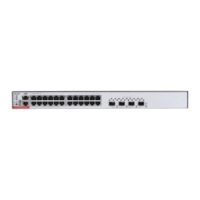Command Reference OSPFv3 Commands
Displays the OSPFv3 neighbor information.
Use this command to start the route redistribution in order to import the routing information of other
routing protocols to the OSPFv3 routing process. Use the no form of this command to restore the
default setting.
redistribute { connected | ospf process-id | rip | static } match { internal | external [ 1 | 2 ] |
nssa-external [ 1 | 2 ] } | metric metric-value | metric-type {1|2} | route-map route-map-name | tag
tag-value ]
no redistribute { connected | ospf process-id | rip | static } match { internal | external [ 1 | 2 ] |
nssa-external [ 1 | 2 ] } | metric | metric-type { 1|2 } | route-map route-map-name | tag tag-value ]
The directly connected route is redistributed.
The ospf is redistributed. The process-id specifies a particular ospf
instance within the range of 1-65535.
The rip is redistributed.
The static route is redistributed.
It is used in the OSPFv3 route redistribution only and filters specific
routes for redistribution;
internal: inter-area and intra-area routes.
external [1|2]: E1, E2 or all external routes.
Nssa-external [ 1 | 2 ]: N1, N2 or all external routes of the NSSA area.
All sub-type OSPFv3 routes are redistributed by default.
Specifies the metric for the OSPFv3 external 2 LSA with metric-value.
Its range is 0 to 16777214.
Set the metric type for the external route to E-1 or E-2.
Specifies the routing policy for route redistribution.
The name of map-tag can be composed of up to 32 characters.
No route-map is associated by default.
Specifies the tag value redistributed to the OSPFv3 inner route, in the
range of 0 to 4294967295.
The function is disabled by default;
Metric-type: 2;
OSPFv3 routes of all sub-types are redistributed in the OSPFv3 redistribution
No route-map is associated

